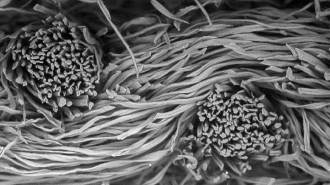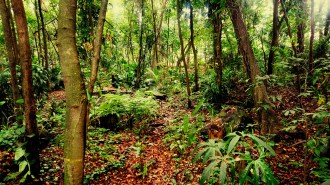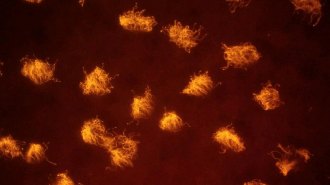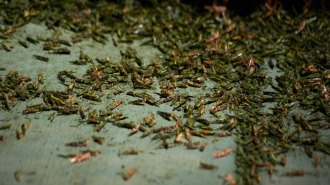Uncategorized
-
 Materials Science
Materials ScienceMicroscopic images reveal the science and beauty of face masks
Important insights into the particle-filtering properties of different fabrics also offer a sense of the unseen, textured world of face masks.
-
 Science & Society
Science & SocietyWe’ve covered science for 100 years. Here’s how it has — and hasn’t — changed
Today’s researchers pursue knowledge with more detail and sophistication, but some of the questions remain the same.
-
 Paleontology
PaleontologyThe dinosaur-killing asteroid impact radically altered Earth’s tropical forests
The asteroid impact fundamentally reset the nature of Earth’s tropical rainforests, decreasing diversity at first and making them permanently darker.
-
 Health & Medicine
Health & Medicine4 takeaways from the WHO’s report on the origins of the coronavirus
The leading hypothesis is that the coronavirus spread to people from bats via a yet-to-be-identified animal, but no animals have tested positive so far.
-
 Life
LifeFlamboyant fishes evolved an explosion of color as seas rose and fell
Fluctuations in sea level due to cycling ice ages may have powered an engine in tropical seas that pumped out gaudy fish species.
By Jake Buehler -
 Health & Medicine
Health & MedicinePfizer says its COVID-19 vaccine has 100 percent efficacy in young people
Vaccinated 12- to 15-year-olds developed higher levels of coronavirus antibodies compared with vaccinated 16- to 25-year-olds from a previous trial.
-
 Planetary Science
Planetary ScienceA meteor may have exploded over Antarctica 430,000 years ago
Tiny spherules recovered from a mountaintop suggest a space rock broke apart midflight and sprayed debris across thousands of kilometers.
By Sid Perkins -
 Health & Medicine
Health & MedicineFrog skin cells turned themselves into living machines
The “xenobots” can swim, navigate tubes, move particles into piles and even heal themselves after injury, a new study reports.
-
 Life
LifeThese are the 5 costliest invasive species, causing billions in damages
Invasive species have cost the global economy at least $1 trillion since 1970 and $162.7 billion in 2017 alone. The annual cost is increasing.
-
 Archaeology
ArchaeologyStone Age culture bloomed inland, not just along Africa’s coasts
Homo sapiens living more than 600 kilometers from the coast around 105,000 years ago collected crystals that may have had ritual meaning.
By Bruce Bower -
 Cosmology
CosmologyPhysicists’ devotion to symmetry has led them astray before
If dark matter WIMPs are mythical, they join the ancient idea that the planets moved in circles.
-
 Animals
AnimalsWeather radar shows 30 metric tons of grasshoppers swarmed Las Vegas one night
Everything’s glitzier in Las Vegas. The most intensely lit U.S. city shows the impact of artificial light on insects on a megascale.
By Susan Milius